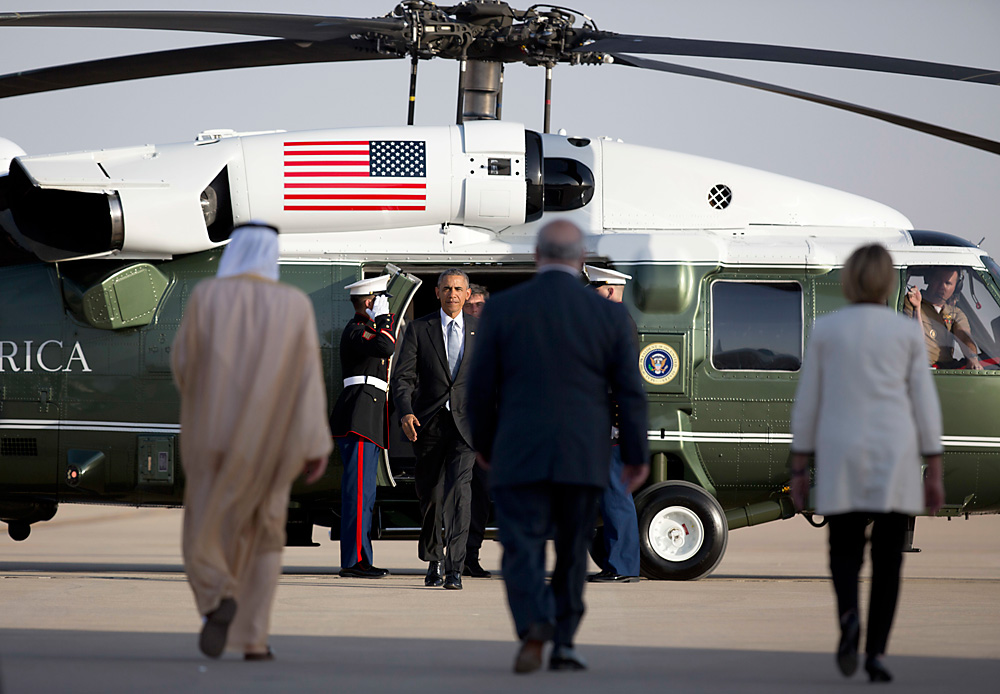
President Barack Obama walks from Marine One to boards Air Force One at King Khalid International Airport in Riyadh, Saudi Arabia, April 21, 2016.
APU.S. President Barack Obama recently concluded a visit to Saudi Arabia, where he participated in a two-day U.S.-Gulf Cooperation Council Summit on April 21.
The U.S. president received a dry reception in Riyadh that arguably revealed the recent estrangement between the United States and Saudi Arabia.
“When President Obama lands in Riyadh he will learn that his allies in the Persian Gulf do not expect assurances of maintaining stability in the Middle East. They will merely inform him of the steps they are ready to take to protect their interests,” wrote Russian daily Nezavisimaya Gazeta prior to Obama’s visit to Saudi Arabia.
Relations between the U.S. and Saudi Arabia have changed substantially and even a new president in the White House will not be able to normalize them, according to the newspaper.
In what appears to be a symbolic gesture, King Salman bin Abdulaziz, the head of the House of Saud, met President Obama at the Al-Auja Palace, delegating the governor of Riyadh to meet Obama on his arrival at the airport.
The robust relations that the White House has traditionally maintained with Saudi Arabia have recently come under pressure as a result of the recent geopolitical developments in the region.
“The conflict in Syria and regional instability are making the leadership of Saudi Arabia cautious of its own ‘Arab Spring’ and of attempts by jihadists to intrude into its territory,” wrote online newspaper Gazeta.ru.
The U.S. may try to utilize Saudi worries to convince Riyadh to participate in the fight against Islamic State more actively, according to Theodore Karasik, a leading expert for Gulf State Analytics in Washington, reported Gazeta.ru.
At the same time, Riyadh has been developing relations with regional partners rather than with the U.S., according to Karasik.
However, the Saudis’ efforts to diversify their foreign policy may even push Riyadh as far as establishing closer ties with Russia, according to Carnegie Moscow Center.
“For the Saudis, the Russian connection is part of a general diversification of their foreign policy away from overreliance on the United States,” wrote Carnegie’s Dmitry Trenin, citing stable oil prices as a shared interest of Russia and Saudi Arabia.
Despite recent improvements, however, relations between Moscow and Riyadh remain strained by Russia’s concern over spread of radical Islamist ideology in the post-Soviet space and competition in the oil market, according to the Carnegie expert.
A package of Saudi-related bills recently introduced in U.S. Congress has further undermined President Obama’s efforts to smooth the way for the new U.S. leadership into the Royal Palace in Riyadh.
If passed, the 9/11 bill introduced by Sens. Chuck Schumer (D-N.Y.) and John Cornyn (R-Texas) would allow Washington to hold Saudi nationals, including members of the royal family, liable in U.S. courts in connection to the terrorist attacks on U.S. soil in 2001, according to Foreign Policy magazine.
The last visit of the U.S. President to Saudi Arabia was largely uneventful, wrote the Kommersant business daily.
“Obama completed his farewell visit to Saudi Arabia before his upcoming departure from the presidential office at the beginning of the next year without new scandals and demarches but also without any breakthrough,” wrote the newspaper.
A breakthrough in relations between Washington and Riyadh will only be possible when the new administration replaces Obama in the White House, according to the newspaper.
Gazeta.ru, meanwhile speculated that the Saudi Arabian authorities “would be happy if Republican Jeb Bush, brother of George W. Bush, became the [next] U.S. president [because] Jeb is personally acquainted with many members of the Saudi family.”
As Jeb Bush has now left the presidential race, however, Riyadh prefers to see Hilary Clinton in the White House, according to the outlet.
An opposing view argues that U.S.-Saudi relations will remain of strategic importance to both states, regardless of who becomes the next president of the U.S.
“This cooperation is a long-term basis, regardless of who will be the new U.S. president. Relationships are not so strongly personified,” Vladimir Akhmedov of the Institute of Oriental Studies in Moscow told Gazeta.ru.
All rights reserved by Rossiyskaya Gazeta.
Subscribe
to our newsletter!
Get the week's best stories straight to your inbox